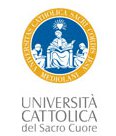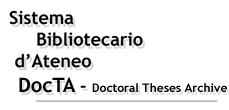|
|
DocTA - Doctoral Theses Archive >
Tesi di dottorato >
CORSO DI DOTTORATO IN SOCIOLOGIA, ORGANIZZAZIONI, CULTURE >
Citazione:
Utilizza queste indicazioni per citare o creare un link a questo documento.
|
Benfante, Chiara. "RISCOPRIRE E COLTIVARE LE CAPACITA' UMANE COME STRUMENTO DI DISAUTOMATIZZAZIONE INDIVIDUALE E COLLETTIVA NELL'ERA DELL'INTELLIGENZA ARTIFICALE", Università Cattolica del Sacro Cuore, XXXII ciclo, a.a. 2018/19, Milano, [http://hdl.handle.net/10280/114594].
|
| Titolo: | RISCOPRIRE E COLTIVARE LE CAPACITA' UMANE COME STRUMENTO DI DISAUTOMATIZZAZIONE INDIVIDUALE E COLLETTIVA NELL'ERA DELL'INTELLIGENZA ARTIFICALE |
| Autore/i: | BENFANTE, CHIARA |
| Tutor: | MAGATTI, MAURO |
| Coordinatore: | CASELLI, MARCO |
| Lingua: | ITA |
| Abstract in italiano della tesi: | Nella "società automatica" la tecnologia è l’elemento dominante. Il filosofo francese Bernard Stiegler la definisce "pharmakon", connotandone la duplice valenza: è "rimedio" utile a supportare gli individui e incrementarne le abilità, ma può anche essere "veleno", qualora impiegata come alternativa all’Umano.
L’automazione in campo industriale è una realtà consolidata da diversi decenni, ma il progressivo estendersi dei campi di applicazione dell’Intelligenza artificiale giunge oggi a interessare ogni ambito produttivo, mettendo in crisi il ruolo dell’essere umano in una molteplicità di contesti.
Occorre pertanto interrogarsi sulla natura e il valore di quelle capacità umane non replicabili dai dispositivi artificiali.
Nella prima parte della tesi si propone una riflessione sul progresso tecnico-scientifico attraverso l'analisi del pensiero di Stiegler. Nella seconda parte si traccia un percorso di riscoperta delle capacità umane, partendo dal tema dell’Intelligenza fino ai teorici del capability approach.
Il caso di studio è stato svolto presso la società di consulenza Deloitte US e lo Interfaith Ministries of Greater Houston, allo scopo di esplorare le modalità di applicazione del progetto "Enduring Human Capabilities", una metodologia innovativa di gestione e valutazione del personale basata sul parametro delle capacità umane intangibili e trasversali, anziché su criteri di tipo quantitativo. |
| Abstract in inglese: | In the "Automatic Society" technology is crucial. The defining notion of "pharmakon", according to Bernard Stiegler, implies a double meaning: on one hand technology is a useful "remedy" to support individuals and increase their abilities, on the other hand it is a poison, a threat to human agency.
Automation in Manufacture has been introduced since decades, however, the range of applicability of Artificial Intelligence is currently widening in every industry, potentially undermining the role of human beings in all contexts.
It is therefore necessary to analyse the nature and the value of those human capabilities that cannot be borrowed or replicated by technological devices.
The first section of this work is focused on the discourse about scientific-technical progress and the thought of Bernard Stiegler. Part Two is about the rediscovery of Human Capabilities, starting from the notion of Intelligence up to the "capability approach".
The case study was carried out at the consulting firm Deloitte US and the Interfaith Ministries of Greater Houston, Texas, with the aim of exploring the implementation of a HR project named "Enduring Human Capabilities", an innovative methodology for managing and evaluating personnel, based on the assessment and development of intangible human capabilities rather than quantitative parameters. |
| Data di discussione: | 15-mar-2022 |
| URI: | http://hdl.handle.net/10280/114594 |
| È visualizzato nelle collezioni: | CORSO DI DOTTORATO IN SOCIOLOGIA, ORGANIZZAZIONI, CULTURE
|
File in questo documento:
| File |
Descrizione |
Dimensioni | Formato | Accessibilità |
|---|
| tesiphd_completa_Benfante.pdf | | 1,75 MB | Adobe PDF | non consultabile
|
| 01_frontespizio_tesiphd_Benfante.pdf | frontespizio e indice | 281,91 kB | Adobe PDF | Visualizza/apri
|
|
Accesso e utilizzo dei contenuti di DocTA
|



